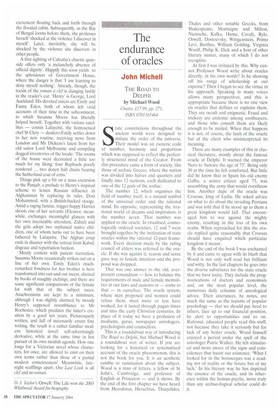The endurance of oracles
John Michell
THE ROAD TO DELPHI by Michael Wood Chatto, £17.99, pp. 271, ISBN 0701165464
State constitutions throughout the ancient world were designed to imitate the order of the universe. Their model was an esoteric code of number, harmony and proportion which was supposed to reflect the perfectly structured mind of the Creator. From this procedure came a form of society, like those of archaic Greece, where the nation was divided into halves and quarters and finally into 12 sections, each dedicated to one of the 12 gods of the zodiac.
The number 12, which organises the field of number itself, is a natural symbol of the universal order and the rational mind. Its opposite, representing the irrational world of dreams and inspiration, is the number seven. That number was applied to the oracle. In ritualised, cosmologically ordered societies, 12 and 7 were brought together by the institution of state oracles within the rational 12-part framework. Every decision made by the ruling council of elders was referred to the oracle. If she was against it, reason and sense gave way to female intuition and the proposal was dropped.
That was one answer to the old, everpresent conundrum — how to balance the requirements of male and female mentalities in our laws and customs or — come to that — in ourselves. The oracle system, where men proposed and women could refuse them, must more or less have worked, for it lasted through pagan times and into the early Christian centuries. In place of it today we have a profusion of mediums, gurus, newspaper astrologers, psychologists and counsellors.
This is a roundabout way of introducing The Road to Delphi, but Michael Wood is a roundabout sort of writer. If you are looking for a historical or systematised account of the oracle phenomenon, this is not the book for you. It is an aesthetic ramble or rumination about the subject. Wood is a man of letters, a fellow of St John's, Cambridge, and professor of English at Princeton — and it shows, By the end of the first chapter we have heard from Herodotus, Heraclitus, Thucydides, Thales and other notable Greeks, from Shakespeare, Montaigne and Milton, Nietzsche, Kafka, Hume, Cavafy, Ryle, Orwell, Dostoevsky, Wittgenstein, Primo Levi, Barthes, William Golding, Virginia Woolf, Philip K. Dick and a host of other literary names, many of which I do not recognise.
At first I was irritated by this. Why cannot Professor Wood write about oracles directly, in his own words? Is he showing off his range of scholarship at our expense? Then I began to see the virtue in his approach. Speaking in many voices allows many perspectives, and this is appropriate because there is no one view on oracles that defines or explains them. They are occult and enigmatic. Fraud and trickery are endemic among soothsayers, and those who consult them are likely enough to be misled. When that happens it is not, of course, the fault of the oracle but of the client who misinterpreted its meaning.
There are many examples of this in classical literature, mostly about the famous oracle at Delphi. It warned the emperor Nero to 'beware the age of 73'. Being only 30 at the time he felt comforted. But little did he know that in Spain his old enemy Galba, a senior citizen aged 73, was assembling the army that would overthrow him. Another dupe of the oracle was Croesus, king of Lydia. He asked advice on what to do about the invading Persians and was told that if he stood up to them a great kingdom would fall. That encouraged him to war against the mighty enemy, resulting in the loss of his own realm. When reproached for this the oracle replied quite reasonably that Croesus should have enquired which particular kingdom it meant.
By the end of the book I was enchanted by it and came to agree with its blurb that Wood is not only well read but brilliant and witty. In the last chapters he goes into the diverse substitutes for the state oracle that we have today. They include the prognostications of doctors and economists and, on the most popular level, the numerous daily columns of astrological advice. Their utterances, he notes, are much the same as the truisms of popular psychology — that we should pay heed to others, face up to our financial position, be alert to opportunities and so on. Rational, educated people read this stuff, not because they take it seriously but for lack of any better oracle. Wood himself enjoyed a period under the spell of the astrologer Patric Walker. He felt stimulated and more aware of the signs and coincidences that haunt our existence. 'What I looked for in the horoscopes was a reading not of reality or the future but of my luck.' In his literary way he has depicted the essence of the oracle, and its inherence within the human psyche, more truly than any archaeological scholar could do it.


































































 Previous page
Previous page